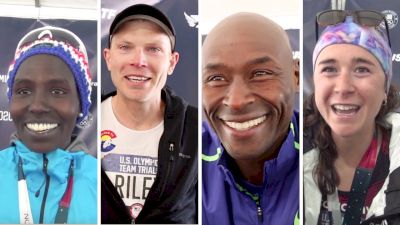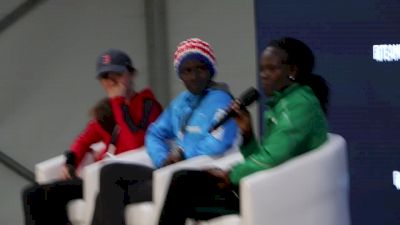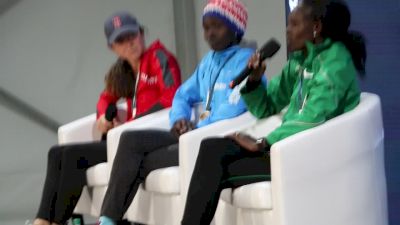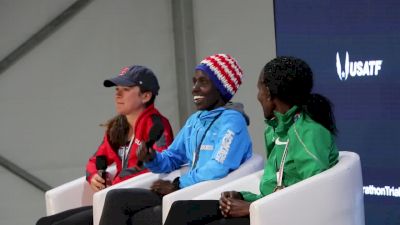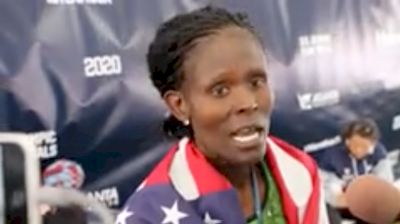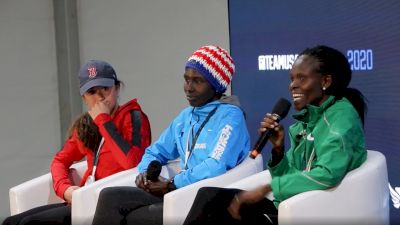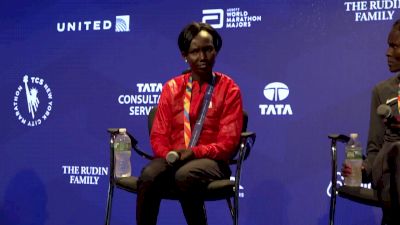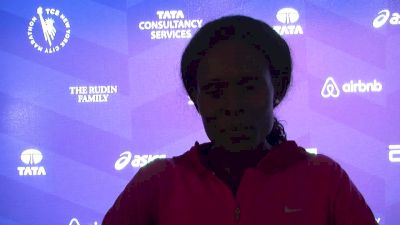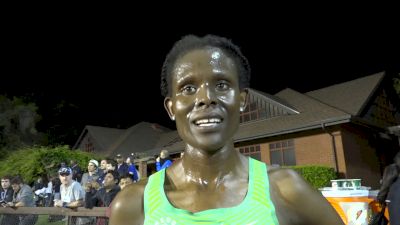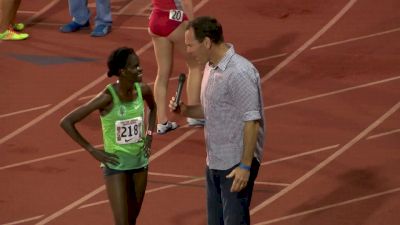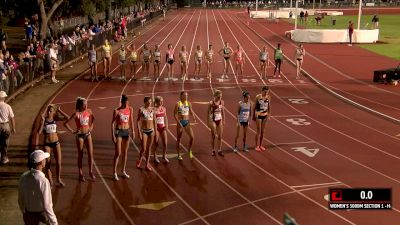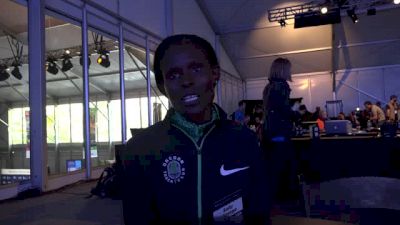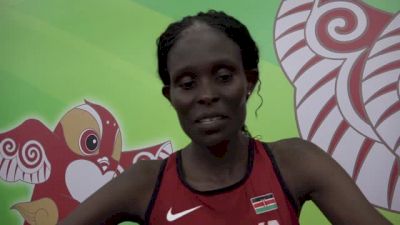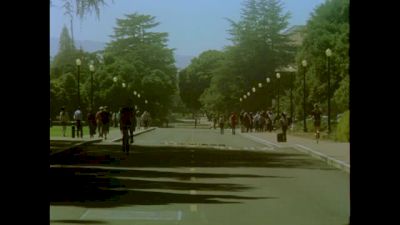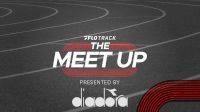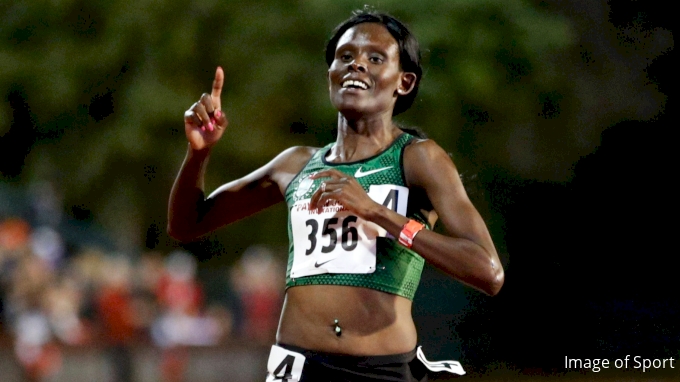
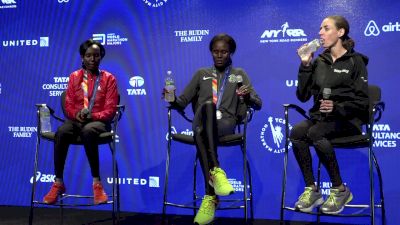
NYC Marathon women's podium press conference part 1
Nov 6, 2016
Transcript by ASAP Sports
Part 2 here.
THE MODERATOR: Mary, three-time champion of the TCS New York City Marathon. Please tell us how you were able to be so dominant today.
MARY KEITANY: This was faster than the race in the last New York City Marathon. I'm happy to be here again. I have to say I'm very excited this morning because I did well again in the U.S., and I'm saying actually today I think I was very focused on this race since my preparation was very okay at home.
Since I didn't get to go to Rio, I had enough time to train, and now I'm happy for this event. Thank you.
THE MODERATOR: Sounds like Rio was quite a bit of motivation for you.
Sally, 2:28.01. Fantastic for you in today's TCS New York City Marathon. While much of the race was going on up front, you were with others in the back. Tell us what we maybe could not see on television.
SALLY KIPYEGO: Thank you. For me, I'm very happy. I'm very happy with the results today. For those that were here last year or know what happened last year, this was kind of a redemption year for me, or marathon for me. I just decided to run behind today and run within myself and make sure I didn't get carried away with the leaders. Stayed within my face, and that paid off today.
I kind of stuck to my plan and didn't get carried away. I think at the end of the day, that is really what helped me get through and be able to finish my first marathon.
THE MODERATOR: Thank you, Sally.
Molly, a New Yorker and your much anticipated marathon debut, 2:28.13. Tell us about it.
MOLLY HUDDLE: I was just thrilled to get through the race smoothly. I thought it was a big step in learning how to race the marathon. It seems like about who manages themselves the best. I feel like I learned a lot today. I'm glad I had a good experience, and I'm really happy to be third.
Q. Mary, you're the first runner to have won three consecutive New York City Marathons in 30 years. Can you describe what that means to you?
MARY KEITANY: Maybe you can repeat your question.
Q. You're the first runner to have won three consecutive races. The last time that happened was 30 years ago. That's pretty significant. What does that mean to you? Can you describe that?
MARY KEITANY: It means a lot to me. I'm very excited that I got it again, three times. I know that it's not easy, but I got it. So it means a lot to me.
And also, my family, my God, and everybody there at home.
Q. A question for Molly. You mentioned that you learned some lessons out there today and how to run the marathon. Could you be a little bit more specific about what those lessons may be.
MOLLY HUDDLE: Yeah, I just think about pacing myself. Around 8 or 9, there was a little bit of a breakaway, and I had to decide if I go or stay. I think, Sally, you made more of an even move, and that paid off a lot at the end today. I kind of went a little harder around mile 8 and was alone for a while. Then slowed down a little bit too much on the bridge at mile 15, and I think that just -- I need to measure myself a little better.
I'm happy with how I finished. I think I saved a little bit for the end. So just some fine tuning on pacing myself and kind of navigating hills. I'll probably train more on harder terrain next time.
Q. Congratulations to each of you. Mary, last year you said you had a strategy when you were running and you won. Did you come in today with a strategy for today's race? And this question is for each of the other runners.
MARY KEITANY: I think that I was very ready for this event since I had good time for preparation for this race. So I'm saying that I was very ready.
THE MODERATOR: Sally, the question also for you, your strategy coming in for strategy for the race.
SALLY KIPYEGO: The strategy for today was to basically have a solid performance. Like I said, I wanted to run within myself and stick to something that I felt was more conservative. I kind of came in thinking that I'd rather run a much more conservative race, hold something back, and be able to have a good experience just because this is a new distance for me and I want to have a good experience and at least have a marathon under my belt to move forward. So it was to hold myself back and try to have a good experience.
MOLLY HUDDLE: My strategy today was similar, to just finish my first marathon and have a good experience. I kind of figured I couldn't go much faster than 5:25, 5:30 if there was a breakaway. To just focus more on place than time but kind of keep myself within those limits and see where that put me.
Q. Molly and Sally, you just finished great over the last several miles. When you're kind of in no woman's land, how do you keep your -- what are you telling yourself over the last few miles when really no one's around you?
SALLY KIPYEGO: Those two last miles can be difficult. I just kept telling myself to look forward, don't worry about who's behind you, and keep your head down and try to stay in rhythm. Everybody's tired. Everybody's feeling the pain. So just hang on, and hopefully that gets you through the finish line. That was pretty much all I thought the last bit of that.
MOLLY HUDDLE: Yeah, I was just trying to finish the race, and if I saw someone up ahead start to come back, I kind of just looked ahead and kept my eyes fixed ahead.
I kind of felt like I didn't have much control over whether I could chase someone or not. I was just kind of surviving at the end, but I'm happy I didn't slow down too much.
Q. Mary, you made your breakaway very early this year. Were you worried, or was that your plan to go early? Then once you realized that you had such a big lead, were you aware of your time and thinking of the course record?
MARY KEITANY: I was not imagining of any time, but I just take a lead at the 15 mile. I just went early, and I was not thinking I was near the course record. In any case, I just come into my own pace from the time which I break off and be alone in the streets. For me, I was okay.
Q. Molly, at the end of the race, I noticed your mechanics looked a little different from how they normally look, and I'm wondering, entering this, do you have to change your mechanics from doing normal road races that are short distance? Did you feel it changing at the end? Or is that how you've been running the entire time?
MOLLY HUDDLE: That's just how I look when I'm really, really tired.
Q. Mary, you're the first three-time consecutive winner since Grete Waitz won five consecutive and ultimately nine. Do you think it's possible for you or anyone else to win five consecutive or nine total? Can you win four? Can you win five or more?
MARY KEITANY: Maybe yes.
Q. So Molly, this is your first marathon. Why don't you describe for us how you felt over the last few miles? Did you feel kind of a tiredness you hadn't expected, or is it like your long runs?
MOLLY HUDDLE: I knew I'd be pretty ragged at the end just because the course gets really difficult, coming up Fifth Avenue, I think it is, by the park there. That's a big hill, and the park is a little hilly.
So I was kind of just surviving at the end and looking ahead and really trying to catch Joyce and trying to catch Sally, but you were too fast. So just kind of flailing the last 10K probably -- well, probably the last 10 miles actually.
But I felt like I held it together, like I didn't feel like I hit a solid wall, per se. So I'm happy with that. I think maybe I managed the fluid and gels pretty well, so that's why things didn't fall apart too, too bad. But I did feel like I was tightening up in weird places.
Q. Did the wind play a factor for you at all?
MOLLY HUDDLE: Yeah, I felt -- I had been running alone since mile 9 or so, and the wind was really strong when you didn't have a pack.
Q. Molly, I was just wondering, given your strong marathon debut, what's next for you in terms of distance running?
MOLLY HUDDLE: I'm not really sure marathon-wise what would be next. I plan to go back to the track next spring. So probably just a regular track season. I'm not sure if I'll do a race or a half or anything in March. We'll see how I recover.
Q. Sally, that was your best race in a few years. Are you going to be a full-time marathoner now?
SALLY KIPYEGO: Well, I might do track in there, but I think it's just that time to move to the next level, and I think marathon is going to be the next adventure for me moving forward from now. Maybe a spring marathon probably will be my next goal, but you never know. I'll probably go back to the track once in a while.
Q. Mary, what was it like to see your kids at the end, to see your children when you reached the finish line?
MARY KEITANY: When I was crossing the line, I was seeing my kids just around there, and I think they were cheering me, and I was happy for them to be in New York for the first time since they accompany me and cheer. They have just cheered me. And this morning my daughter was just telling me, mom, good luck and try not to fell down like what I did in London. So I tell my child, let me just try my best. Pray for me. When I crossed the line, she was happy. Ultimately, I was happy too.
Q. Sally, what did you learn from your New York City Marathon experience last year that you applied to the race today, and what changed to produce a better outcome this time around?
SALLY KIPYEGO: I think the biggest lesson that I learned from last year was that the marathon is definitely not a sprint. Just because you feel good for 20 miles doesn't really mean that much really in a marathon. You need to be able to survive the whole 26.2 miles.
So I think I respected the course, and if you saw how I raced today, I held back a lot, and I didn't go, and I stayed with -- ran within myself. I think that was the greatest gift that came out of last year. It was a disappointing experience for me last year, but I learned a lot, and I think I ran well today because I had that experience last year.
So I'm grateful for that. Even though it was a difficult day, it turned out to be great today.
Q. Molly, what was more painful, the last 10,000 meters today or the last 9,900 meters in Rio?
MOLLY HUDDLE: It's so different. Rio was like more intense pain, and this was more just grinding, just a long, long grind. So they're just different, apples and oranges.
